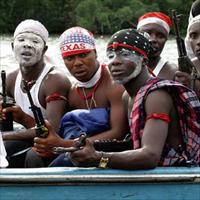NIGERIA: Tensions rise with start of trial of Delta leader

"We have pulled out of any peace talks, we have not
disarmed so there really is no progress since Henry's arrest," the
spokesman for the Movement for the Emancipation of the Niger Delta (MEND) who
goes by the name of Jomo Gbomo wrote in an e-mail to IRIN on 13 April.
MEND is an alliance of militant groups claiming to fight
for an increase in the percentage of wealth that the people of the Niger Delta
get from the oil that is being exploited in their region.
Gbomo said that militants would target oil installations
even if the oil companies repair pipe lines. “It only takes a few minutes to
destroy what took years to build."
Prior to Okah's arrest, leaders of the militants had
agreed to a temporary ceasefire. In August 2007 the newly-elected government of
Umaru Yar'Adua initiated peace talks in Nigeria’s
capital Abuja.
But in September Okah was arrested in Angola and by
December the militants called back the people negotiating on their behalf. The
negotiators pledged to return by January but the talks remain on hold.
Okah was extradited to Nigeria in February to face charges
of arms dealing, oil bunkering and treason. MEND then issued a statement saying
that it would not participate in future negotiations until Okah’s release or
take part in a proposed Niger Delta Peace Summit that has been repeatedly
delayed.
Unifying the enemy
The militants in the MEND alliance had become fragmented
in recent year but Okah's arrest may now be unifying them, a professor of
political science in Port Harcourt,
Elias Courson, told IRIN. "Okah has enemies and friends in the Niger
Delta," Courson said. "But [by arresting him] the government is
rallying support for him."
One of the more violent and well-organised militias led
by Ateke Tom, whom MEND says is not in the alliance, said he too would boycott
further talks. "The government cannot arrest people while continuing to
make peace talks,” an anonymous representative of Tom said. “[Ateke believes
that Okah] should be released in order not to aggravate tensions in the
region."
Secret trial
Militants say they are outraged by a court decision to
make the trial secret. Local human rights groups disapprove of the
proceedings.
"The people of this country should have the benefit
of knowing what happened and if indeed he has committed those crimes including
treason, how he did that," Isaac Osuoka, director of Social Action in Port Harcourt, told IRIN.
Okah’s defence team will challenge the decision of a
closed hearing on 22 April. The government’s prosecutor argues that a public
trial would be a threat to security.
Who’s the man?
Okah is thought to be the original spokesperson for MEND
that goes by the name of Jomo Gbomo and who has made hundreds of statements to
the press over the years, claiming responsibility for the countless attacks and
kidnappings in the Delta.
But the accusations against him focus on arms dealing.
In October 2007, a former militia leader Mujahid Dokubo-Asari, who was himself
arrested for treason, published an open letter detailing his relationship with
Okah, recounting numerous weapons purchases starting in 2003. "We… coined
him at the time 'Master of Arms' from where many now call him Master,"
Dokubo-Asari stated in the letter.
Okah is also accused of having arms dealing connections
with the Nigerian military. One of the charges that he faces is that he bought
arms from the Nigerian Army Ordinance Depot in Kaduna and took them to the Niger Delta.
Army goes free
MEND says that the real reason the government is keeping
the trail secret is to protect its own. "There are many top people in the
past and present government that will prefer Okah dead because of their
complicity in oil bunkering, political assassinations, and other hard facts
that we know about and which Okah will have no qualms in speaking out about in
an open court of law," said the current MEND spokesman who also uses the
name Jomo Gbomo.
On 27 March, Human Rights Watch issued a statement on
the issue. "Although the federal government recently charged prominent
militant commander and alleged arms dealer Henry Okah with treason, this is not
a meaningful gesture against impunity if the government's political allies are
not prosecuted for their role in perpetrating similar crimes," the
statement read.
 Back and Next - Back and Next
Back and Next - Back and Next See Also - See Also
See Also - See Also